· 13 min read
Why Do Recruiters Get a Bad Rap?
Recruiters often receive a bad rap due to the negative feedback from candidates. In this blog post, we uncover why recruiters get this bad reputation and how to improve your reputation as a recruiter.
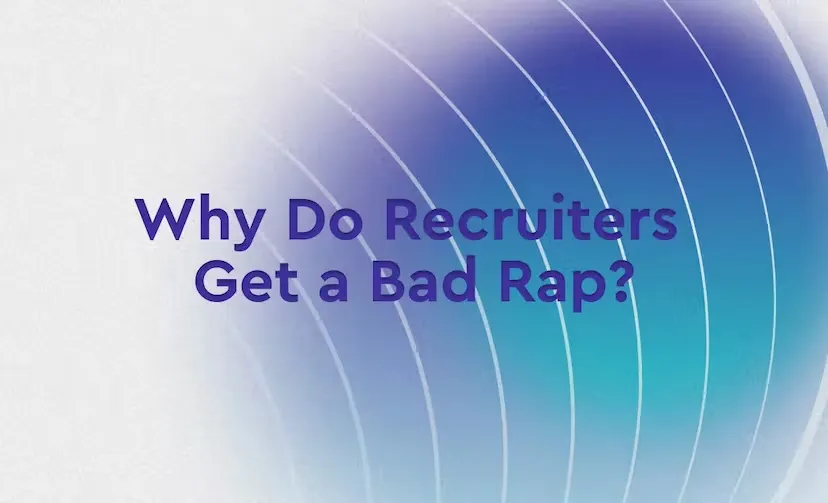
· 13 min read
Recruiters often receive a bad rap due to the negative feedback from candidates. In this blog post, we uncover why recruiters get this bad reputation and how to improve your reputation as a recruiter.

How you can be better as a recruiter.
Here we go again…another negative post about recruiters. Just another day in the life of a recruiter, I guess.
Recruiters’ ulterior motives, poor communication, and aggressive behavior have left a sour taste in many people’s mouths.
The negative reputation comes from a combination of factors. But before you begin to question your career path, asking “is recruiting a good career for me?”, let’s take a breath.
A good reminder is that being a recruiter – while often thankless – is one of the most important jobs out there.
It is crucial for you to remember that you have the power to change someone’s life for the better. Getting someone higher pay, work flexibility, health benefits, or a whole new career trajectory can drastically improve their life.
People’s skepticism about recruiters’ intents and purposes are hard to dismiss, you might be curious whether this mindset can be changed.
Throughout this blog post, we explain why recruiters are getting a bad rap and what it is you can do to help put an end to it.
The Dark Side: 5 Nightmare Stories of Recruiters Being Bad at Their Job
The Bright Side: 5 Wondrous Behaviors Recruiters Should Adopt to Break the Stigma
Those before you did not know how to stay organized as a recruiter and dropped the ball when it came to candidate management.
Now, you and other recruiters are plagued with this bad rap until you learn to implement a stronger recruitment communication strategy.
But was this reputation actually deserved? Are your peers really exhibiting the signs of a bad recruiter? Maybe.
Let’s take a closer look at the pros and cons of recruitment and why recruiters have a bad rap.
What happens when you put together a profession and a place with seemingly negative connotations?
The answer: Recruiting Hell. And there’s a whole subreddit for it. Thousands of threads, to be exact, that showcase recruiters who “just don’t get it.”
They’ve provided more than enough jaw-dropping content to substantiate why recruiters have a bad rap.
Warning: you might want to grab a cup of water to spit take with.
The more candidates say, ”the recruiter ghosted me,” the less credibility recruiters will have.
Candidates rely on recruiters to keep them abreast of their positioning and progress throughout the sequence of interviews and beyond.
Failing to keep candidates updated will leave them confused about the status of their application, which can be detrimental to the relationship.
Ghosting prevents successful hiring…
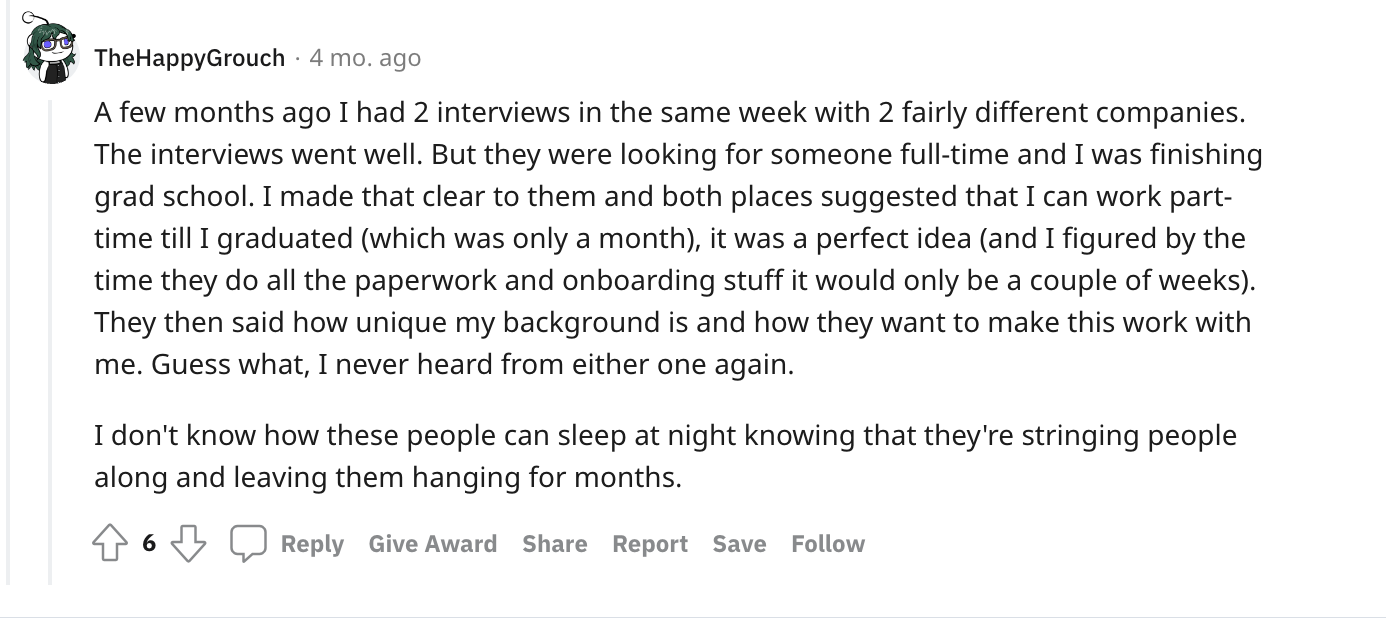
So going radio silent or saying you’ll do something and then not actually doing it is not only rude but is a main contributor to a negative reputation.
Don’t let providing feedback after an interview, scheduling next steps, or passing a resume along to a manager slip through the cracks.
Make sure to personally invest time and energy into contacting the candidates!
Everyone is busy, so schedules can change suddenly and unexpectedly.
But don’t “no show” without proper notice. Refusing to acknowledge you are wasting someone’s time can lead to a very negative candidate NPS.

If a meeting gets moved around, which they often do, it is important to make everyone involved aware of the shift.
Candidates often don’t know what to expect when working with a recruiter and may feel like they are being kept in the dark about important details.
One of the most crucial tasks of your job is showing up for your candidates. If you display genuine interest in helping them and are invested in the process, it will run much smoother!
Behaving unprofessionally is like black mold. One pore decision and 24 hours later the problem has spread faster than you can say “oh no, I didn’t mean it.”
All too often, candidates are seen as numbers on a spreadsheet rather than actual people.
Recruiters can be pushy and sales-oriented which frustrates candidates who are already feeling overwhelmed about their job search.
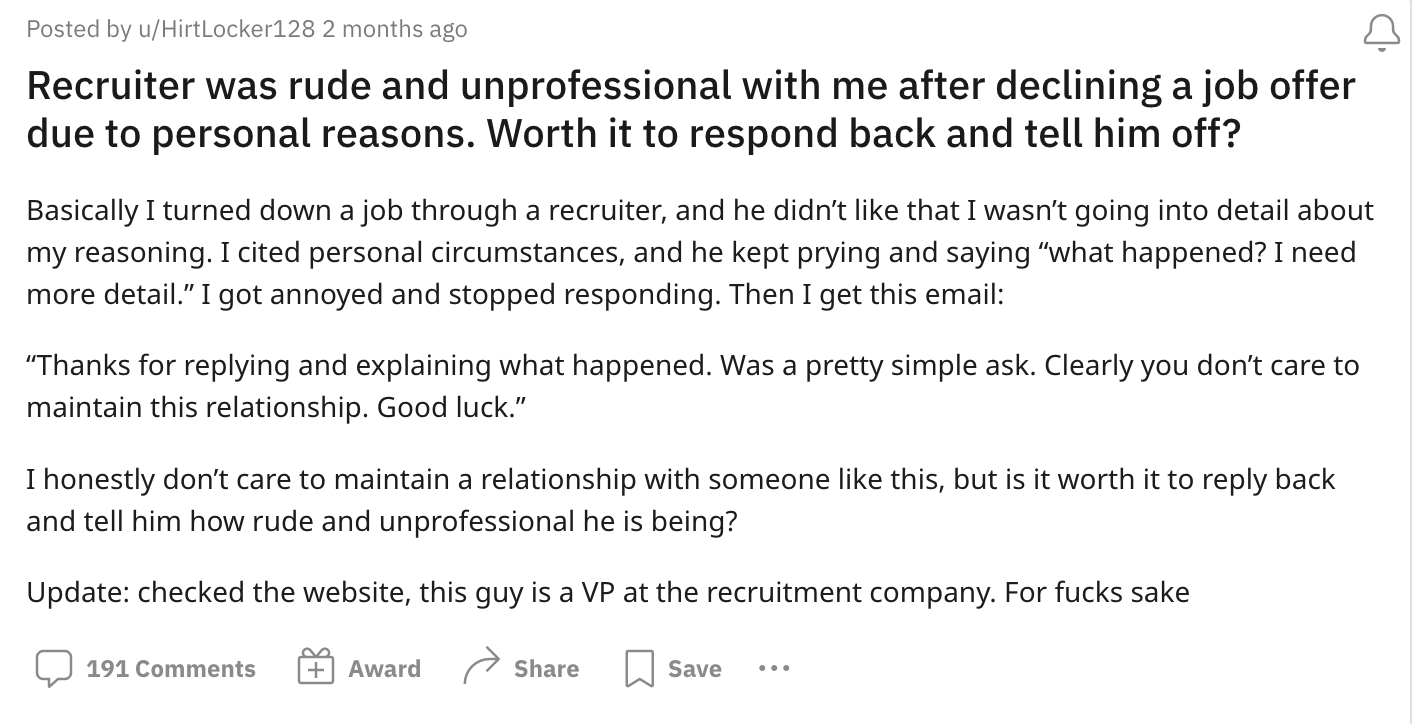
Eager to make a placement, and drive up their KPIs, a recruiter can pressure a candidate into making a decision about a job that they are not fully sure about, or to settle for a job that is not a good fit for them.
Boiling it down to compensation, or more importantly, gross margins, causes dollar signs to burn in recruiters’ eyes.
Typically, recruiters go in with the intention of a big commission payout rather than being consultative and providing candidates with the information and guidance they need to make an informed decision
Paying attention to detail is a skill all recruiters must master.
Without it, the risk of a candidate mistrusting you increases significantly.
Not reviewing a candidate’s profile or resume with great accuracy leads to recruiters asking repeat questions and making wild accusations which can lead to a bad candidate experience.
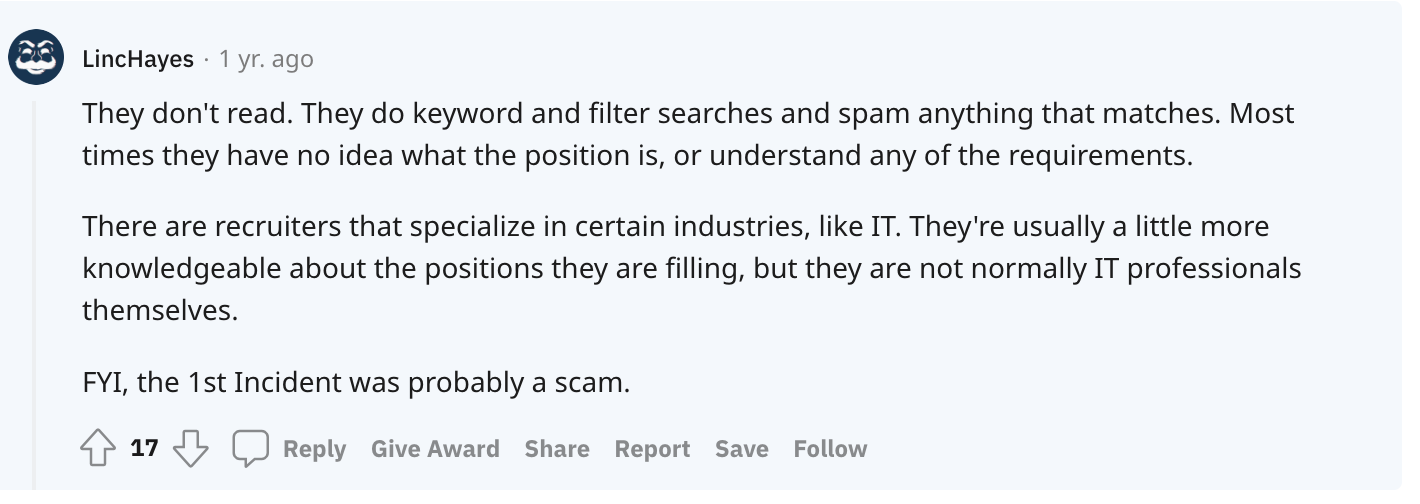
If you do not dedicate time getting to know your candidate, why should they spend the time doing what you asked them to do?
Submitting candidates to hiring managers just to “see what happens” never ends up working out. It also causes instability in the talent acquisition roadmap.
Having candidates send you their information via email rather than you doing a proper screening call is a definite red flag as well.
Put forth the effort to do your job now. You won’t have a chance to go back and do it again.
Never, under any circumstance, should a recruiter knowingly provide false information about a company.
Straight up lying to inflate the opportunity at hand is one of the biggest mistakes you can make. It will come back to haunt you.
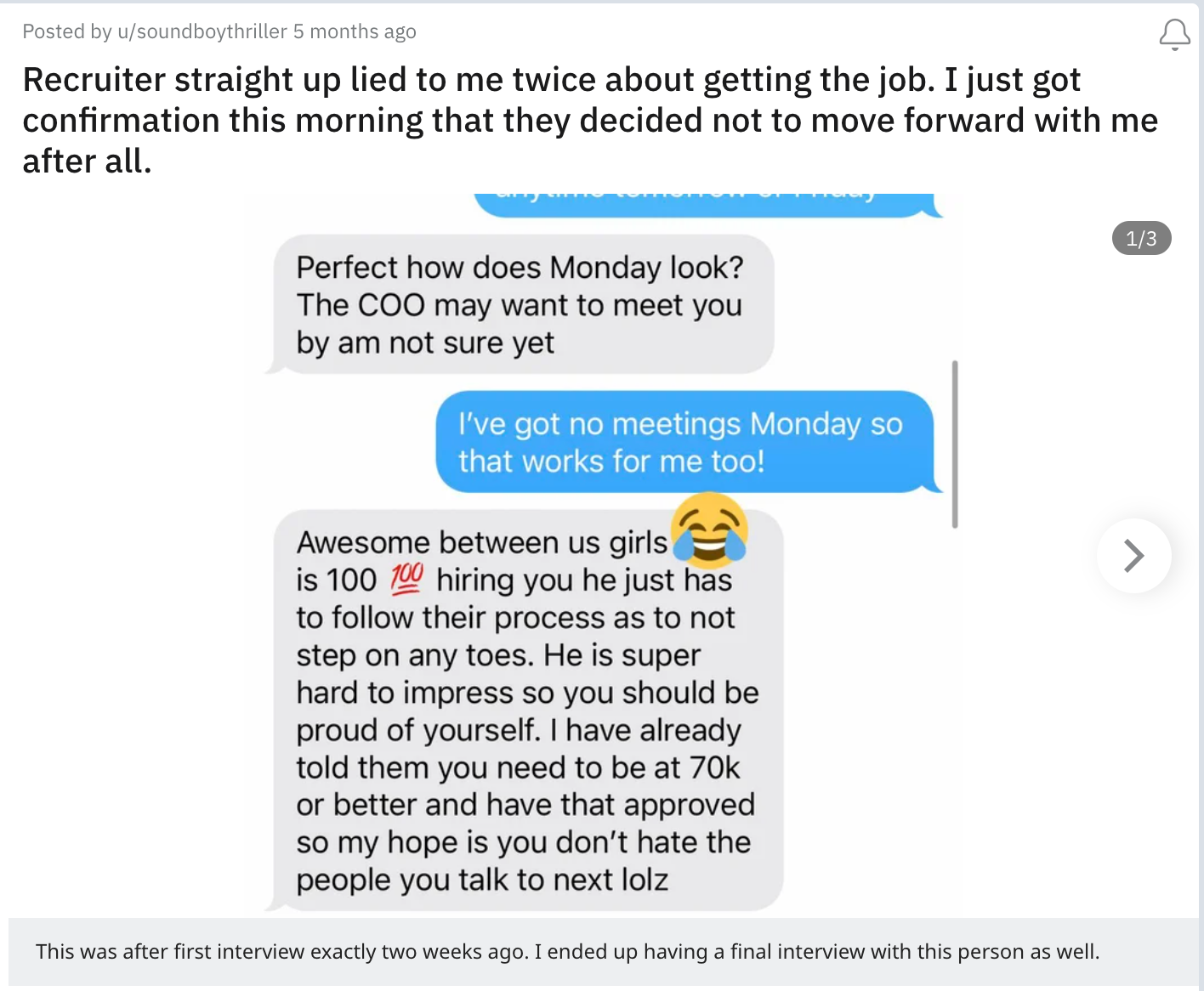
Promising the job or dangling salary, benefits, or added perks in front of a candidate’s face just to retract them causes an immense amount of unreliability in recruiters.
If you are unsure about an aspect of the company, don’t fill in the blanks with the best you can come up with. A candidate would much rather hear you say you do not know but you will find out and get back to them than incorrect answers.
Now is a good time to part these clouds and shed a little light on the situation.
Just to remind you, recruiting is hard. It remains one of the most misunderstood and undervalued positions to date.
So if you realized you’ve been guilty of one of the aforementioned mistakes, don’t fixate on it. It does not necessarily mean you are doomed, nor are those mistakes the only signs of a bad recruiter.
Learning from your own and others’ mistakes is what separates a good recruiter from a great one!
Keep reading for ways to break the stigma and some real candidate’s positive experiences dealing with great recruiters.
It is critical to learn how to stay organized as a recruiter so you can prioritize your tasks and improve your overall productivity.
Recruiters have many different assignments to manage, so ensuring you don’t miss any deadlines is key.
Avoid wasting time on unnecessary tasks and focus on the ones that are most important.
Here is a list of ideas to help you stay on track:
At its core, being organized as a recruiter requires a combination of tools, strategies, and habits.
A quick example of how an organized recruiter made a candidate comfortable throughout the process:
“I remember my recruiter emailed me saying they were going on holiday for a week and would not be available during my upcoming interviews. Instead of just leaving me high and dry to figure things out on my own, they were able to introduce me to another point of contact who I could use as a resource in their absence. Knowing that my recruiter had been so organized before they left and implemented a plan during their absence left me feeling well taken care of!” - Blair W.
A recruiter should be responsive to candidate needs and they should provide them with valuable advice and guidance.
Conduct in depth interviews to assess candidate qualifications and provide personalized feedback and guidance. Focus on helping them find the right job for their skills and interests builds a genuine long-term relationship!
These experiences leave a lasting impression and make it easier for candidates to trust recruiters in the future.
Envisioning yourself as the candidate and having empathy for them helps you understand their situation better.
Working together to find common ground will strengthen the recruitment communication strategy so recruiters can be more responsive to candidate needs.
A quick example of how a recruiter’s empathy stood out for a candidate:
“I am a mother of 3 children so when I was seeking a new role, I needed to be able to work flexible hours. My recruiter, also a mother, understood how vital it was for me to get my kids off the school bus. To know my recruiter went above and beyond expectations to secure me a schedule that fit my lifestyle, really made a positive impact on my experience!” - Roberta J.
Often a big challenge facing the recruiting industry is the lack of transparency around the process.
Candidates are not sure what to expect when working with a recruiter. They may not even be aware of how a recruiter is paid, acquires new roles, or sources for certain positions.
Develop a deep understanding of the necessary skills and experience in high demand for your specific industry job market and instead of keeping them in the dark about important details, be as open and honest as you can possibly be.
Provide them with detailed feedback regarding their application or interview as this is essential to maintaining a trusting relationship. Take advantage of the insights and connections you have to offer.
And remember, never leave a candidate wondering where they stand in the process!
A quick example of a candidate trusting their recruiter:
“I had never worked with a recruiter before mine reached out to me on LinkedIn. Was I supposed to pay them for finding and presenting new roles to me? It was not until our first conversation that I really saw the true benefits of having a trusted individual on my side. I was interviewing for roles at companies I would have never dreamed I would get in front of! Plus, I would have never known what actually goes on behind the scenes of an interview process without their help and guidance!” - Loretta B.
Being observant is an important skill and when we pay attention we improve the quality of our work and make better decisions.
Partnering with hiring managers to get a thorough understanding of specific hiring requirements can help you spot important information on profiles in order to source and attract the best possible talent.
Practicing mindfulness and being present in the moment allows us to focus on what we are doing. And when we are mindful, we are more likely to notice small details and mistakes that we might otherwise miss.
It’s also helpful to have a system for checking work. Proofreading a document or outbound message for spelling and grammar errors is key to a good first impression.
That’s especially true when sending email sequences. Calling the candidate the wrong name or sending an introduction to their work address are easy mistakes to make, but they are equally avoidable.
Of course, no one is perfect and we will all make mistakes from time to time. However, putting in the extra effort to minimize them will positively affect your workflow.
A quick example of how noticing the details can make you a better recruiter:
“Something that goes unnoticed is taking the time to write a personal statement on a LinkedIn profile. Virtually connecting with strangers can have its awkward moments so I enjoy sprucing the conversation up a bit. I see adding background information as a good conversation starter so I am flattered when someone takes the time to not only read mine but wants to speak about it afterwards. When my recruiter contacted me, they referenced my passion for Harry Potter and even picked up on my infatuation with corny dad jokes. It felt good knowing someone took the extra time and paid attention to the details to get to know more about me!” - Madi G.
Perhaps the biggest value that recruiters provide is their ability to open doors.
Many companies, especially larger ones, have processes in place for working with recruiters.
When candidates go through a recruiter, they have an easier time getting their foot in the door and landing an interview.
And once they get it, recruiters are there to provide valuable coaching and advice to help them succeed.
Having an “in” with a company allows you to push stronger talent through and increase their chances of getting an interview, and maybe even hired!
A quick example of a recruiter changing a candidate’s life with a new opportunity:
“I was getting burnt out from applying to jobs and getting rejected. It seemed as though my resume was constantly pushed aside and I could never get through to the hiring manager to showcase my skills. A recruiter reached out to me and after having an in depth conversation, they mentioned they worked with a company that I had been keeping my eye on for some time. To have a personal connection to get me in front of the hiring manager really increased my chances and my confidence! I ended up getting the position and I am still so thankful for the help and dedication my recruiter had in helping me! Best thing is that when I thanked the CEO for the opportunity, he said don’t thank me, thank your recruiter!” - Jessica H.
At the end of the day, there are many pros and cons of recruitment. Not all job seekers are going to have a positive experience with recruiters.
Many still have a limited understanding of what a day in the life of a recruiter actually is, which can lead to negative perceptions and a bad candidate experience.
To some, agency recruiters have the extensive knowledge of the market and a well-connected range of employers, giving them the ability to connect candidates with opportunities not as publicly advertised.
To others, recruiters are only interested in making placements and earning a commission.
Right now, recruiters have it hard. But, it is important to stick with it and stay optimistic.
Dedicating yourself to breaking the recruitment stigmas will someday wash away the sour milk taste from candidates’ mouths.
Stay consistent with providing valuable services to both companies and candidates and over time, the mindsets will change!